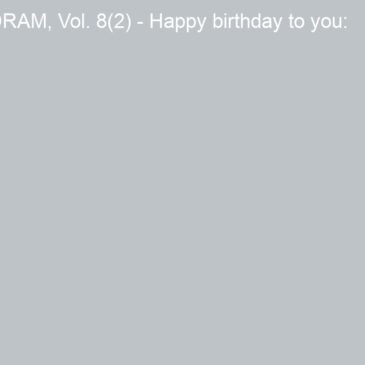For many people, the college years are a time of increased risk for binge drinking and other risky drinking behavior (The DRAM, Vol. 7(2); The DRAM, Vol. 5(3); The DRAM, Vol. 6(3)). Researchers have determined that some events, like holidays, can dramatically increase such risk (Addiction and the Humanities, Vol. 3(9); The DRAM, Vol. 6(2)) among college students. This week, The DRAM reviews research that examined how the event of turning 21 years old affects risky drinking behavior among college students (Neighbors et al., 2011) compared to other special events and baseline risky drinking behavior (i.e., college student drinking on a typical weekend).
Method
- Between February 2008 and August 2008, the researchers invited, four days after their 21st birthday, 2,113 undergraduates from a large northwestern university in the United Statesto participate in a survey.
- Respondents included 1,124 undergraduates (55% female; 62% White; 53% response rate).
- A 45-minute survey assessed past 90-day alcohol use using the Timeline Followback calendar. Researchers calculated daily Blood Alcohol Content (BAC) from information provided about weight, amount consumed, and time spent consuming.
Results
- On average, respondents reported drinking 10 (SD=12.0) days during the past three months, consuming an average of 4.4 (SD=3.4) drinks per drinking day, and reaching an estimated BAC of 0.1 on drinking days.
- Using regression techniques that accommodate large numbers of zeros (i.e., non-drinking days and 0.0 BACs) in the model, the authors investigated the association between special events and drinking participation.
- Special events, such as an individual’s 21st birthday, and certain holidays change students’ risk for engaging in alcohol consumption (see Figure). For instance, the experience of a 21st birthday is associated with dramatically larger BAC levels and drinking participation.
| Predictor | BAC X 100 | Drinking |
| Intercept | 8.2 (7.8, 8.7) | 0.18 (0.17, 0.19) |
| Women | 8.0 (7.4, 9.2) | 0.14 (0.12, 0.16) |
| Weekday | 7.1 (3.7, 7.5) | 0.09 (0.08, 0.10) |
| 21st Birthday | 18.6 (17.2, 19.8) | 0.90 (0.87, 0.93) |
| New Year’s Eve | 12.6 (10.6, 14.9) | 0.66 (0.50, 0.74) |
| New Year’s Day | 12.2 (10.2, 14.9) | 0.37 (0.28, 0.48) |
| Super Bowl | 8.5 (6.1, 11.1) | 0.08 (0.05, 0.12) |
| Fat Tuesday | 9.6 (7.4, 11.4) | 0.09 (0.07, 0.14) |
| Valentine’s Day | 7.6 (6.4, 8.5) | 0.42 (0.35, 0.52) |
| President’s Day | 6.2 (4.4, 8.5) | 0.07 (0.04, 0.10) |
| St. Patrick’s Day | 8.6 (6.9, 9.8) | 0.17 (0.12, 0.21) |
| Spring Break (maximum) | 10.7 (9.7, 11.7) | 0.75 (0.68, 0.82) |
| Cinco de Mayo | 10.5 (9.2, 12.2) | 0.16 (0.13, 0.21) |
| Memorial Day | 6.2 (4.7, 7.7) | 0.09 (0.07, 0.13) |
| Graduation | 9.3 (8.5, 10.4) | 0.28 (0.23, 0.31) |
| Fourth of July | 10.1 (9.0, 11.4) | 0.55 (0.49, 0.67) |
Figure. Means (95% Confidence Intervals) for BAC and proportions of respondents drinking, by event (adapted from Neighbors et al., 2011). Bold values indicate p<.05 . Click image to enlarge.
Limitations
- The study has a relatively low response rate.
- The findings are likely to be culturally specific; international researchers might consider other holidays and events that are likely to raise risky drinking behavior among college students.
- Although the Timeline Followback calendar methodology is widely used and well-tested, retrospective self-reported drinking behavior might differ from actual drinking behavior.
Discussion
The results suggest that there are predictable periods of elevated risky drinking among college students, an age cohort that already experiences elevated risk over other cohorts. Interestingly, whereas some periods are consistent with conventional wisdom, others (e.g., St. Patrick’s Day) do not appear to elevate drinking. These findings are useful because they suggest important events that administrators and others might target for enhanced prevention and intervention attempts. This research yields practical suggestions that might improve the health and well-being of at-risk college students.
-Debi LaPlante
What do you think? Please use the comment link below to provide feedback on this article.
References
Neighbors, C., Atkins, D. C., Lewis, M. A., Lee, C. M., Kaysen, D. Mittmann, A., Fossos, N., & Rodriguez, L. M. (2011). Event-specific drinking among college students. Psychology of Addictive Behaviors, 25(4), 702-707.




